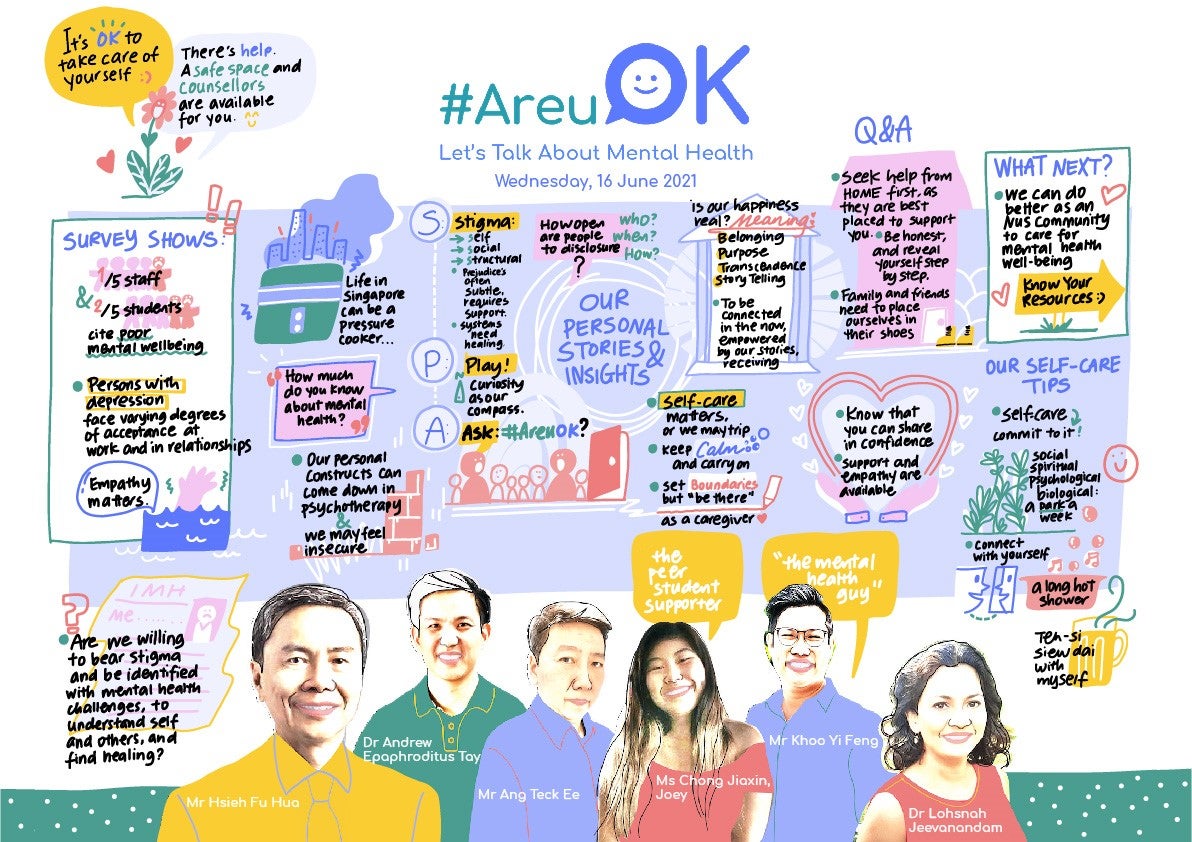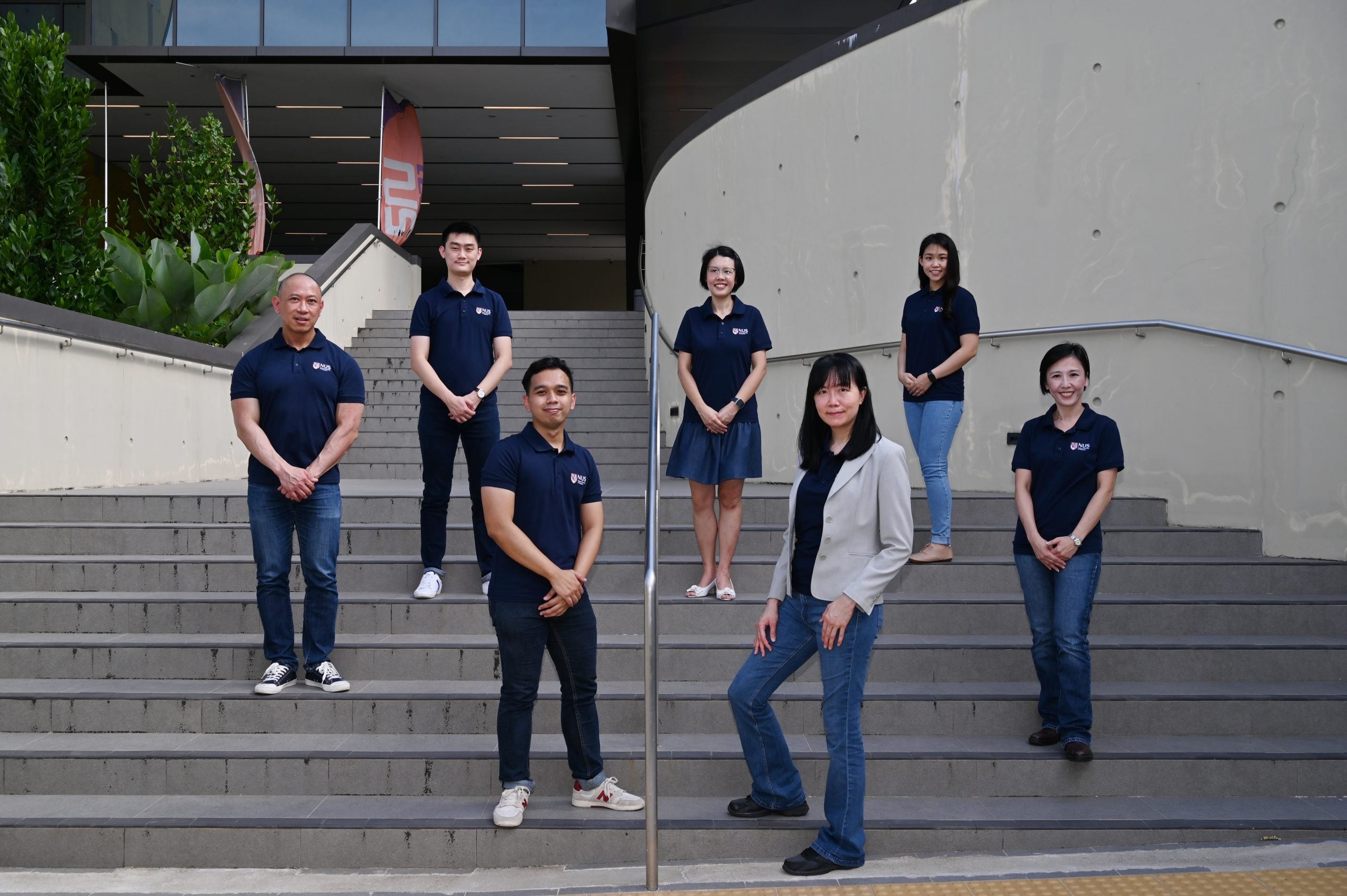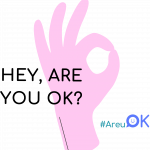Life in campus can be exciting as we connect with friends and colleagues, and integrate into vibrant NUS Community.
However for some of us, our lived experience may be overwhelming due to a variety of reasons.
That's why it's important that we show up for one another and set a positive tone of psychological safety, empathy and inclusivity.
We want you to know that it is okay to be not okay and that we have resources to help care for your health and wellbeing.
#AreuOK – Post Campaign Survey Findings
In 2021, the Health and Wellbeing team spearheaded a campus-wide #AreuOK mental health campaign in which we strived to destigmatise mental health conditions and drive resource awareness.
In collaboration with the Office of Data and Intelligence and Saw Swee Hock School of Public Health, we have analysed the data collected during the post-campaign survey, and the key findings can be accessed by clicking the button below.
#AreuOK – Let’s Talk about Mental Health Seminar
On 16 June, close to 600 NUS staff and students attended a virtual seminar on mental health which marked the culmination of the #AreuOK campaign.
Moderated by Dr Lohsnah Jeevanandam, Director of the NUS Clinical Psychology Programme, the seminar featured a panel of mental health experts and advocates, including NUS Chairman Hsieh Fu Hua.
The key takeaway was that mental health struggles are common and there is nothing to be ashamed about. The speakers also emphasized on self-care and seeking help. In this regard, check out the one-stop resources pages for staff and students.

Video Features
How can we support colleagues at work in terms of their mental wellbeing?
Hear from NUS Health and Wellbeing Head and Director, Dr. Andrew Tay, and Lead Psychologist and Senior Wellbeing Specialist Partner, Dr. Kinjal Doshi, as they share various tips on supporting our colleagues at work.

What are some common mental health myths?
Hear from NUS Health and Wellbeing Head and Director, Dr. Andrew Tay, and Lead Psychologist and Senior Wellbeing Specialist Partner, Dr. Kinjal Doshi, as they debunk myths about mental health conditions.

What does it mean to be empathetic in the workplace?
Hear from Chief People Officer, Mr Kevin Chua, as he shares his thoughts on demonstrating empathy at the workplace and busts myths on seeking mental health support.

At NUS, we are also proud to have staff who dedicate their service to the NUS community.
In a series of video interviews and article feature, we find out how they support and uplift the wellbeing of the NUS community.
In this video, we spoke to 5 staff to learn more about their roles as Student Wellness Manager, Student Support Manager, Counsellors and Life Safety Officer.

Article Feature: NUS Care Officers
Another important group of frontline wellbeing heroes are the Care Officers from the NUS Care Unit who support NUS students and staff who have been affected by sexual misconduct.

Read on to learn more about the role of a Care Officer, their thoughts about mental health, and common misconceptions associated with the role.
As a Care Officer, I provide support for staff or students who have been affected by sexual misconduct. Sexual misconduct refers to any act of a sexual nature committed against a victim through force, intimidation, manipulation, coercion or without the victim’s consent. It can be a highly traumatic experience. By tapping on their innate strengths and bridging them to resources in the community, I empower my clients to deal with the distressing situation and emerge a survivor! I visualize myself as walking alongside my client when they are at their most vulnerable and making them feel a bit less small, less scared, and ready them for healing.
In a nutshell, I provide a safe space to talk about difficult topics like sexual assault and abuse, and offer focused tailored care to each affected individual.
It’s important to highlight that Care Officers at NCU don’t work in isolation. We are a part of the campus-wide support network. To address the special needs of a small group of sexual misconduct victims, we rally and build on the resources of the NUS community, thus strengthening our collective resilience to adversity, and invigorating our instinct to empathize and help.
Many people confuse our job as having a part in investigation, especially when the investigation is conducted internally by university departments like the Office of Campus Security. This couldn’t be further from the truth. While Care Officers help and empower their client to navigate the judicial and disciplinary processes, we do not influence investigation nor the judicial outcome in any way. Our role function and scope is distinct from the investigator’s. This is necessary to preserve impartiality and remove dilemmas of conflict. Therefore, we are independent from investigation, and also do not interact with the accused person.
Another misconception is that Care Officers are not professionally trained for the job; that we’re people who are simply passionate about helping others. In fact, my colleagues and I were specially recruited, plucked from diverse professional care settings to start up Victim Care Unit (now NUS Care Unit). We have specialized degrees backed by years of experience across industries like the Police, social work, and medical case management. The service we provide to clients is evidence-based, trauma-informed, and imbued with practical and theoretical knowledge. We’re not just bleeding hearts!
I’ve always felt a calling to work in the helping profession. I’ve also witnessed just how intrusive and damaging sexual assault and abuse can be and how it really shakes a person to the core. It’s probably one of the most trying and distressing thing to experience in life. Seeing that, it just compels me to want to do something to make things a little less difficult for them.
Seeing my client get back on their feet, feel stronger, find themselves again – these recovery milestones make me proud to have played a positive role in my client’s life. It’s a privilege to witness the strength and resilience of the human spirit, triumphing against the odds.
Hmmm… two unorthodox analogies come to mind. First, I think of it as a surgeon’s knife. On one hand, it could save lives. On the other hand, it could harm and maim. It all depends on the surgeon’s mastery over their tool. So it is with mental health. If we have mastery over our mental health, it will carry us through the toughest situation. If we don’t achieve sufficient mastery, however, we could succumb to mental illness over time. The key is to understand your own unique mental health needs, and what makes it thrive.
Another analogy is that of a car, in particular, its engine. The engine is not visible under the shiny bodywork of the car, just as our state of mental health is not readily discernible to others, sometimes not even to ourselves. However, it’s really core and essential to a person’s overall well-being and functioning, such that if it is not healthy, the entire person cannot fully flourish and fulfil his or her best potential. I suppose the lesson here to have a regular “maintenance schedule” – cherish, nurture and invest in our mental health.
Exercise is a big thing for me. No matter how busy, I make it a point to exercise twice a week – either pounding the pavement or working out at the gym. I’ve also tried HIIT, Pilates, fitball classes, and love them!
I surround myself with supportive people whom I trust and can depend on when things get rough. I make sure I reach out to them even when I feel tempted to withdraw and shut off.
Then, there’s me-time. These are quiet moments when I reflect on the beauty of life and my purpose in it, so I can recalibrate and realign myself with my core beliefs and values.
Learn to listen to your body. Mental and physical health are closely intertwined and affect each other in many ways. Personal wellbeing is therefore holistic – it’s located on a spectrum that spans mind and body.
It’s ok to… not be perfect. To be happy doesn’t require one to be perfect – so aim for happiness, not perfection.
To be mentally healthy – to live life fully – doesn’t mean you never experience depression or anxiety, in the same way that being physically healthy doesn’t mean you are never sick, or free from any disability. You can attain mental and physical health despite challenging circumstances; sometimes it’s because of them that make us stronger! We have the choice of how we deal with problems. Reach out to sources of support rather than giving up or withdrawing.



